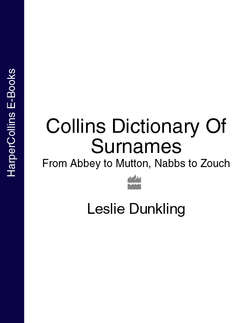Читать книгу Collins Dictionary Of Surnames: From Abbey to Mutton, Nabbs to Zouch - Leslie Dunkling - Страница 11
SURNAME LANGUAGES
ОглавлениеThe simplified summary given above omits at least one vital factor which affects the interpretation of a surname - its language of origin. It may be an Old English name, Old English being a technical description of the English language before the 11th century. Between the 11th and 14th centuries, following the huge impact on it of Norman French, the language is known as Middle English. From the 15th century onwards we refer to Modern English, though as any reader of Shakespeare knows, many words have changed their meanings since his time. Because of the Scandinavian settlers, many of our surnames are based on Old Norse words. Others are French, specifically the dialect of Old French spoken by the Normans. Some names are Dutch, brought to England by Flemish craftsmen. There are also the many names which have a Celtic origin, in Scottish or Irish Gaelic, Welsh or Cornish. In modern Britain the situation is more complicated still, thanks to our multi-national society.
It is obviously essential to know what language we are concerned with when we are seeking the origin of a surname. If you were asked the meaning of the word pain you might say something like ‘bodily discomfort.’ But if the word is French rather than English, then its meaning is ‘bread.’ The situation is further complicated in the case of surname, since we need to ask, what did this word mean, in such and such a language, in the Middle Ages. As it happens, pain in Middle English often meant ‘judicial punishment,’ a meaning which has become obsolete other than in one or two fossilized phrases. For a good example of how the original language of a surname can affect its meaning, see the entry at Belcher.
The fact that surnames began life in different languages helped to confuse still further the spelling situation. If an English-speaking clerk was trying to write down something he was hearing from a speaker of Welsh, for instance, he would be completely baffled by Welsh sounds that do not exist in English. French-speaking clerks had equal difficulty with English names; Scottish and Irish Gaelic created difficulties for those who did not speak those languages. One recalls the stories of immigrants arriving at Ellis Island and being given ‘American’ names by officials who could not understand what was said to them. When asked by other officials what his new name was, one man is said to have replied: Ich hab vergessen, ‘I’ve forgotten.’ He was registered as Ichabod Fergusson. Another version of this story turns Schön vergessen ‘already forgotten’ into Sean Fergusson.
